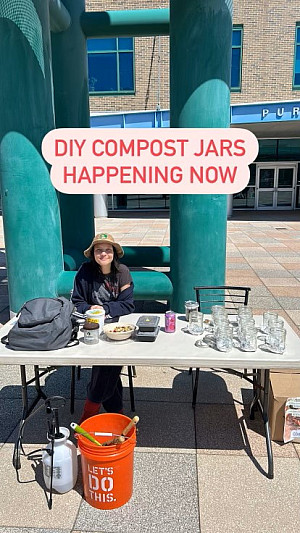What I learned as a Campus Composting Intern
May 31, 2024
Open gallery

Isobelle Novak
Major: Philosophy
Class of 2024
This internship opened my eyes to how Sustainable Action functions on a larger level. Especially with a federally funded school like SUNY Purchase, I was unaware of all the details and people that have to be talked to for approval in order to make things happen. For example, the reimplementing of the dishwasher at D-Hall, replacing plastic bottles with cans in vending machines and the Hub/Market, or increasing the frequency of the Loop during peak commuter times. There is a surprising amount of bureaucratic back and forth that has to occur with administration, dining services or SUNY in order to move forward.
I also learned that everything comes down to money. Even when morality and environmental issues are on the line, companies want to make sure they will continue to make money. A shift for the environment will not be considered as seriously if it means less money for the institution. As immoral as it is, that’s just how it seems to work. People require numbers and assurance that whatever sustainable action you take will lead to, for example, increased enrollment. My most important takeaway has been that if you don’t push things, they will not happen. It’s also crucial to make plans for your goals with hard deadlines and actionable steps so that it’s clear to everyone involved (especially the student body) what exactly is happening and when.
The biggest project that I worked on was the Compost in a Jar Event. There were two events on April 17th and April 22nd for Earth Day. We set up by the Clock Tower so people walking to or from class could take a look if interested. This event required that I do a good amount of research about composting, particularly in such a small container. I watched Youtube videos and read articles about people who had composted in a jar. I was able to tell people about the process of composting and what’s required (carbon, nitrogen, water and air), and tell them what they could be composting (ex: coffee grounds). It also served as a great tool to tell students about the Rocket and how we wanted to implement post-consumer waste composting with D-Hall and the Hub by using local food waste haulers. We even had two Broadview residents that stopped while walking by to listen and make a jar of their own. Even if people didn’t want to make a jar using our provided materials, I had the opportunity to tell them about the process, why it’s beneficial, and what our team was doing on campus. This event, which was Samantha’s idea (Compost Master), was a great way to inform people about what’s actively being done on campus to improve food waste and provide soil for the Native Plant Garden.
As a Philosophy Major, I was thrilled that I was able to participate in the Sustainability Team with mostly Environmental Studies Majors. I think it’s awesome that these internships are open to all majors and all that is required is a passion for Sustainability and some basic knowledge. I will carry what I’ve learned with me in my future career and in my day to day. I will continue to learn and educate people on how we can best give back to the Earth and work towards a more Sustainable practice in our local communities and as a species. My Senior Project talks about developing an ethics of care based on the world we share with plants, and this internship has helped me understand how we can do that practically.